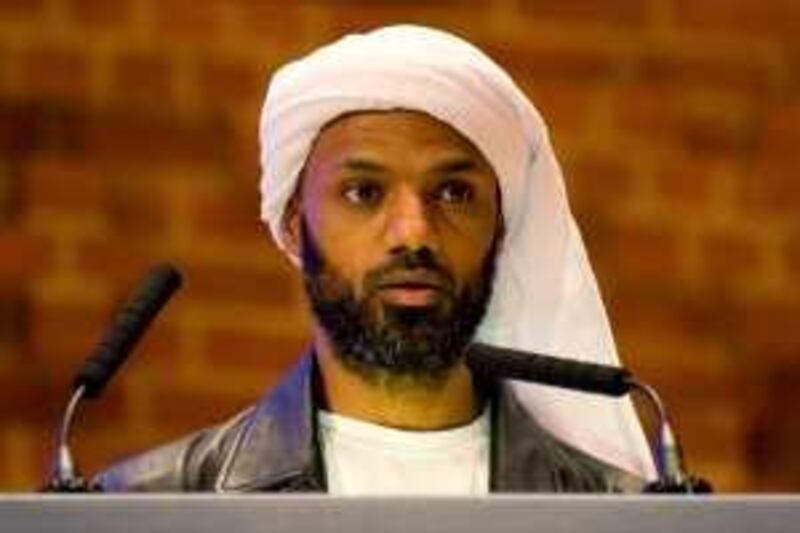LONDON // The British government and its spymasters will go to court today in a bid to keep secret much of the evidence surrounding the alleged ill treatment of a half-dozen former Guantanamo Bay inmates.
The six ex-prisoners, all UK citizens or residents, are mounting a claim for damages against the government, alleging that Britain's intelligence services were complicit in their ill treatment. All six deny any involvement in terrorism and maintain that MI5 and MI6 - respectively responsible for homeland and overseas intelligence gathering - assisted in their unlawful imprisonment and their "extraordinary rendition" to locations around the world.
They all claim they were subjected to inhuman and degrading treatment and, in some cases, torture. For its part, the government is denying any complicity in the men's treatment. But it wants to keep secret from the men's lawyers much of the evidence it intends to use in its defence. So today, at the start of an action that will probably last years and cost the British taxpayer tens of millions of pounds, government lawyers will begin to argue their case for non-disclosure before three of the country's most senior judges, sitting in the Court of Appeal in London.
A High Court judge ruled in November that there seemed no reason why judges hearing the damages case could not take the highly unusual - and controversial - step of permitting the use of the so-called "closed material procedure". Under this procedure, which was intended for criminal cases, the government and security services' lawyers would not have to disclose information to the claimants if they felt it would damage national security, international relations, the detection and prevention of crime, or otherwise harm the public interest.
Instead, the material would be disclosed to "special advocates" - lawyers who had undergone security vetting and clearance. These advocates could then try to persuade the court that documents crucial to the claimants' case should be shown to their lawyers. If the court ruled against their disclosure, the advocates could use their knowledge of it to conduct part of the case on the claimants' behalf.
Such a situation is not to the liking of the claimants, human-rights groups and media organisations. The former prisoners say the procedure would make it impossible for their own lawyers to pursue their cases properly as they would constantly be in the dark over the government's defence, including any allegations of the claimants' connections with terrorists. Several newspapers and the BBC are also contesting the move, saying the introduction of the "closed material procedure" would, by its very definition, prevent a fair and public hearing of the case.
Shami Chakrabarti, the director of the civil rights group Liberty, said: "Secret courts are a contradiction in terms, but the government has allowed them to disease our legal system for nearly a decade. "National security cannot be an excuse for illegality. Only the antiseptic light of day will expose past mistakes and allow the rebuilding of trust in vital agencies." But if rebuilding trust in those agencies relies on this court case, it promises to be a long, slow process. The government estimates that it will need several years to prepare its defence and legal experts predict that it will take seven years before there is a final outcome.
The cost will be enormous for the British taxpayer, which is not only funding the government's costs but also that of the claimants, who are all receiving money from the public purse to pay their lawyers. Last week, The Daily Telegraph estimated that the total bill for legal expenses could be £30 million (Dh167m), two-thirds of it incurred by the government and the remainder by the claimants. Should they be successful, the very most that each claimant could expect would be about £500,000. As the ill treatment suffered by five of them is considered less severe than the worst case - that of Ethiopian-born Binyam Mohamed - they would probably get considerably less.
The claimants' hopes of success, however, received a boost last month when Lord (David) Neuberger, the master of the rolls - the head of the civil justice system in England and Wales - decreed that MI5 had a "dubious record" in the case of Binyam Mohamed. Mr Mohamed, 31, was arrested in Pakistan in 2002 where he was interrogated by US and Pakistani agents - with the collusion of an MI5 officer, it has been alleged.
The Ethiopian said he suffered "cruel, inhuman and degrading treatment" before being flown to Morocco, where he was tortured. He was later taken to a prison in Afghanistan and, finally, to Guantanamo Bay, from where he was released early last year without charge. In February, Lord Neuberger took the exceptionally unusual decision to publish his draft legal opinion on MI5's respect for human rights.
The British security services have denied knowledge of any ill treatment of Mr Mohamed, but Lord Neuberger said in his ruling: "In this case, that does not seem to have been true. "Some security services officials appear to have a dubious record relating to actual involvement - and frankness about any such involvement - with the mistreatment of Mr Mohamed when he was held [in Pakistan] at the behest of US officials."
dsapsted@thenational.ae






